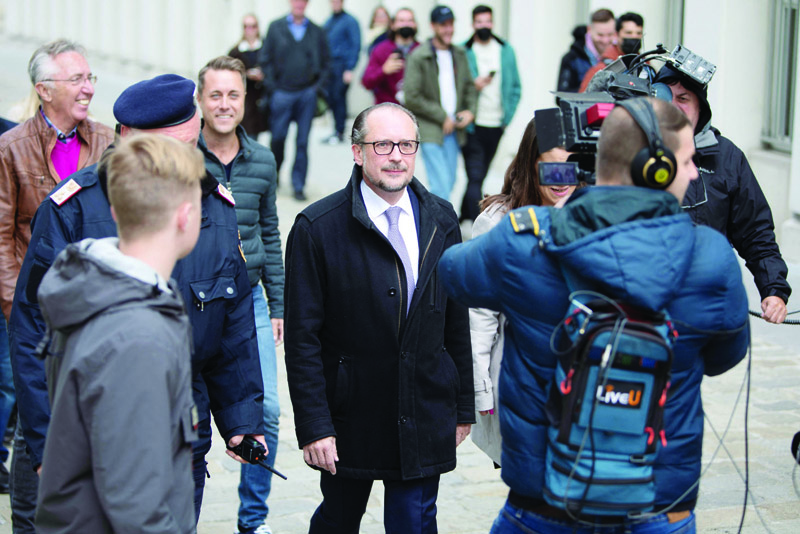VIENNA: Austria's top diplomat Alexander Schallenberg is expected to take over the chancellorship, a day after Sebastian Kurz announced he would step down amid graft claims, capping the spectacular rise of one of Europe's youngest political leaders. The 35-year-old conservative announced late Saturday that he was stepping down as chancellor, bowing to pressure to resign after he was implicated in a corruption scandal.
Saying he wanted to "make space to prevent chaos," Kurz-who has headed two governments over the last four years-has suggested foreign minister Schallenberg to take over the chancellery. The 52-year-old diplomat was to meet President Alexander Van der Bellen following a meeting with Vice Chancellor Werner Kogler of the Greens. Schallenberg has yet to speak publicly, but Kogler indicated late Saturday that his party would support him to keep the conservative-Greens coalition in government.
Pressure on Kurz to resign, including from the Greens, started after prosecutors on Wednesday raided several locations linked to his People's Party (OeVP). They announced that Kurz and nine other individuals were under investigation over claims that government money was used between 2016 and 2018 in a corrupt deal to ensure positive media coverage. Kurz has denied any wrongdoing, reiterating on Saturday that allegations against him were "false" and that he would seek to clear up the matter while he continues as party leader and as a lawmaker in parliament.
'Shadow chancellor'
The opposition has blasted the continued conservative-Greens coalition given the graft investigation, with Social Democrats (SPOe) leader Pamela Rendi-Wagner saying even on the back benches Kurz would remain a "shadow chancellor". Commentaries in media yesterday echoed those words, saying it remained to be seen if Schallenberg could step up to lead the country in his own way.
"There is no doubt that he (Kurz) assumes that he will be able to pull the strings from the not-so-subtle background," wrote Hans Rauscher, a columnist for the left-leaning Der Standard, dubbing Kurz "tricky Sebastian". The OeVP-Greens coalition-a first at a national level-entered office in January 2020 and has already been put under strain several times by the fallout from other corruption scandals and differences over questions such as refugee policy.
In the latest scandal, prosecutors' core allegation is that between 2016 and 2018 finance ministry resources were used to finance "partially manipulated opinion polls that served an exclusively party-political interest". This correlates to the time period in which Kurz, already a government minister, took over the leadership of the OeVP and later that of the Alpine nation at the helm of a coalition with the far-right Freedom Party (FPOe).
Prosecutors allege that payments were made to an unnamed media company-widely understood to be the Oesterreich tabloid, which was also raided on Wednesday-in return for publishing these surveys. In 2019, Kurz's first coalition with the FPOe collapsed after his ally became engulfed in a corruption scandal dubbed "Ibizagate". But fresh elections once again saw Kurz's OeVP come out on top, leading him to form a coalition with the Greens from January 2020. - AFP



